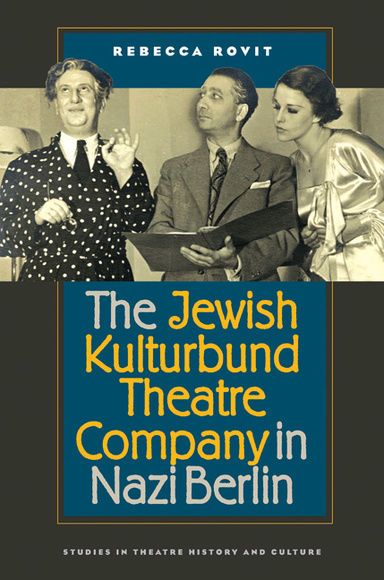The award-winning Studies in Theatre History and Culture series of the University of Iowa Press will publish The Jewish Kulturbund Theatre Company in Nazi Berlin by Rebecca Rovit on Sept. 1.

Laws enacted after Hitler’s ascent to power removed all Jews from their professional workplaces and banned Jewish artists from any collaboration with their fellow citizens.
In the summer of 1933, Goebbels’s Prussian Theatre Commission approved an all-Jewish theatre as part of the Kulturbund Deutscher Juden, the Cultural Association of German Jewry. This network of Jewish cultural leagues and theatre ensembles across Germany coexisted with Nazi policies against Jews until the Gestapo dissolved the theater in 1941.
Revealing the complex interplay between history and human lives under conditions of duress, Rovit focuses on the eight-year odyssey of the Berlin Kulturbund and its theater.
She draws upon a wealth of primary documents—correspondence between the theater and the Reich Ministry of Propaganda and Enlightenment, actual scripts and rolebooks, production reviews and photographs, letters and memoirs, and interviews with artists who survived the war—to show how the increasingly restrictive German reality forced Jewish artists to define and redefine their identity and culture under wrenching conditions of censorship, compromise, danger, and deception.
The Kulturbund’s directors were repeatedly caught between escalating demands from their Nazi overseers and from their own Jewish constituents. By examining why and how an all-Jewish repertory theater could coexist with the Nazi regime, Rovit raises broader questions about the nature of art in an environment of coercion and isolation, artistic integrity and adaptability, and community and identity.

Alan E. Steinweis, the author of Art, Ideology, and Economics in Nazi Germany, commented, “The cultural and artistic life of German Jews during the Nazi era has only recently begun to attract the attention that it deserves. Rebecca Rovit’s book on the Berlin branch of the Jewish Kulturbund is a major contribution to the scholarship in this area.
“It is the most thorough study of the Kulturbund in any language. The book very successfully integrates multiple levels of analysis, examining aesthetics, performance, the personal biographies of German Jews, Nazi policy, and the organizational challenges that confronted the leaders of the Kulturbund.
“Based on research in a wide range of archival collections, it makes excellent use of information garnered from interviews with some of the Kulturbund’s members. Written with precision and empathy, it should be read by anyone with an interest in Jewish life in Nazi Germany.”
Rovit is an assistant professor of theater at the University of Kansas. The author of numerous articles on theater and performance in journals, she is the coeditor of Theatrical Performance during the Holocaust: Texts, Documents, Memoirs, a finalist for the National Jewish Book Award.
The Studies in Theatre History and Culture series, which publishes scholarship on the historical contexts of theater and cultural performance, features a full spectrum of historical methods and perspectives. Books in the series have won many awards, including the Barnard Hewitt Award from the American Society for Theatre Research, the Theatre Book Award of the Society for Theatre Research, the Research Award in Theatre Practice and Pedagogy from the Association for Theatre in Higher Education, the Joe A. Callaway Prize, and the George Freedley Award from the Theatre Library Association.
The book will be available at bookstores or from the UI Press, 800-621-2736 or www.uiowapress.org. Customers in Europe, the Middle East, or Africa may order from Eurospan Group at www.eurospanbookstore.com.